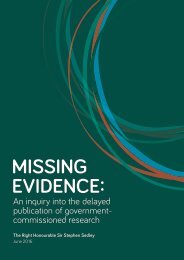INSIGHT & INSPIRATION FROM APHA’S 2012 MIDYEAR MEETING
INSIGHT & INSPIRATION FROM APHA’S 2012 MIDYEAR MEETING
INSIGHT & INSPIRATION FROM APHA’S 2012 MIDYEAR MEETING
Create successful ePaper yourself
Turn your PDF publications into a flip-book with our unique Google optimized e-Paper software.
15<br />
Survive All In This Friends Prevention, Strategies<br />
& Thrive Together For Health Opportunity & Equity for Health<br />
<strong>2012</strong> Midyear Meeting Opening Session:<br />
‘The Biggest Risk Of American Health Care Today Is That It Will Fail The Moral Test’<br />
Donald Berwick, former administrator of the Centers for Medicare &<br />
Medicaid Services, started his opening session keynote address with an<br />
admission: He wasn’t sure how to address the question of how public<br />
health can thrive in today’s changing health care world. The question,<br />
he told attendees, doesn’t have an easy answer.<br />
The Affordable Care Act, he said, does essentially two things: It attempts<br />
to make health care a right, and to make health care sustainable<br />
via improvements in quality and delivery. The question of how to define<br />
what improvement means — and what we should expect — in an era<br />
of health reform is what motivated Berwick as he worked to transform<br />
CMS to align with the goals of the now-famous “Triple Aim:” Better<br />
care, better health, reduced costs. However, the framework also stresses<br />
the importance of equity — an overriding goal of public health work.<br />
According to a 2008 Health Affairs article Berwick co-authored, the “Triple<br />
Aim is an exercise in balance and will be subject to specified policy<br />
constraints, such as decisions about how much to spend on health care<br />
or what coverage to provide and to whom. The most important of all<br />
such constraints, we believe, should be the promise of equity; the gain<br />
in health in one subpopulation ought not to be achieved at the expense<br />
of another subpopulation...A health system capable of continual improvement<br />
on all three aims, under whatever constraints policy creates,<br />
looks quite different from one designed for the first aim only.”<br />
“The biggest risk of American health care today,” he told opening session<br />
attendees, “is that it will fail the moral test.”<br />
Berwick said, in part, it didn’t matter how the Supreme Court ruled on<br />
the health reform law, as the “health care evolution agenda” had already<br />
left the station and is quickly moving toward improved care coordination,<br />
better transparency, patient-centered care and the adoption of<br />
health care technologies. And the opportunity to provide input as health<br />
care evolves doesn’t depend on your ties to Washington, D.C., he noted<br />
— it’s a community affair.<br />
But what does it all mean for public health? Berwick said he wasn’t<br />
entirely sure. Public health faces real challenges, he said, especially<br />
in communicating its value to the public and to policymakers. It’s that<br />
classic problem of how do you tell the story of a person who didn’t get<br />
sick or injured because of a successful public health intervention? How<br />
do we communicate the value of prevention, even if it doesn’t always<br />
save health care dollars?<br />
So, while Berwick began his keynote not sure about what advice he<br />
could offer, he did end with what he called a prescription for public<br />
health: When possible, reduce costs within public health; cooperate and<br />
don’t work in silos; reach out and partner with nontraditional organizations<br />
and systems; get involved in reducing health care costs and waste;<br />
and mobilize support for public health.<br />
“Public health needs mobilization too,” he said. “If there isn’t political<br />
force behind the public health endeavor, it will remain frail.”



